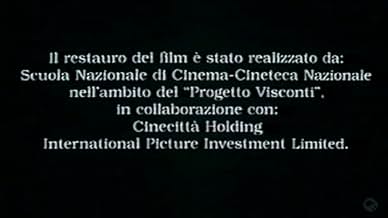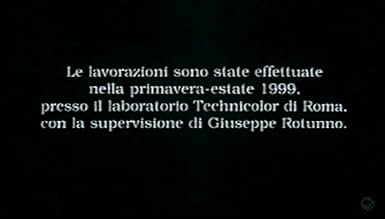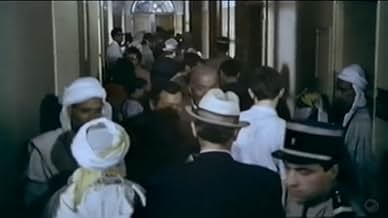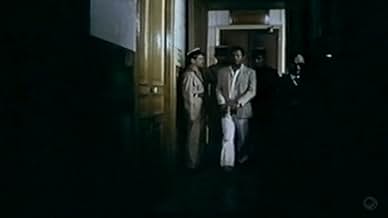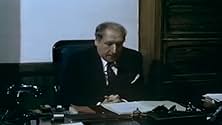Lo straniero
- 1967
- 1 घं 44 मि
IMDb रेटिंग
7.1/10
3.2 हज़ार
आपकी रेटिंग
अपनी भाषा में प्लॉट जोड़ेंA man faces a trial for murder. The court is biased because of his personal qualities.A man faces a trial for murder. The court is biased because of his personal qualities.A man faces a trial for murder. The court is biased because of his personal qualities.
- पुरस्कार
- 4 कुल नामांकन
Jean-Pierre Zola
- Employer
- (as Jean Pierre Zola)
कहानी
क्या आपको पता है
- ट्रिवियाTwenty years before Visconti's adaptation, while Camus was still alive, the novelist had been approached with the idea of making The Stranger as a film by director Jean Renoir.
- क्रेज़ी क्रेडिटThe restoration of the film was carried out by: the National Film School - National Film Library, as part of the 'Visconti Project' in collaboration with Cinecitta Holding International Picture Investment Limited. The work was carried out in the spring & summer 1999, at the Technicolor Laboratory in Rome, under the supervision of Giuseppe Rotunno.
- कनेक्शनReferenced in Costumes from the Films of Visconti (1978)
फीचर्ड रिव्यू
I had heard about this movie and wanted to see it for years, but it's one of that increasingly smaller handful of pictures featuring notable names and a world-class filmmaker (and based on such a book as it is) that is not available, and never has been, on home video (VHS/DVD/VoD, Beta, you name it). So to see it in 35mm is something of a major treat - the question is, how does it hold up almost 50 years later, adapting a book that is nearly 75 years old? Is it timeless? Well, yes... and sort of no, but I'll get to that.
What Visconti does is actually adapt the book quite closely, and even gets into the tone of not so much existential despair as existential don't-give-a-damn. Meursault (Mastroianni) is a character who is affected by the world around him, though that's not to say he's a cynic per-say or completely one to not connect with anyone; clearly he connects with Marie, who cares for him dearly, and he meets a 'friend' in a man who repeatedly hits his woman and has him write a letter for him under dubious circumstances. Oh, and his mother dies to begin with, which becomes a major point of contention later in the story.
The point is that through this story of a man who works as a clerk and keeps to himself and doesn't say much, unless he has something to say or has to, Visconti finds a tone that is curious and yet also distant, which is a kind of contradiction in terms that fits the Camus' style of absurdism. This is a world where there is underlying political strife; it's set in Algiers at a time when France still occupied it (though it's populated by Italians just buy into them being all French, ironic that Karina gets dubbed), and the centerpiece that sets this character heading to oblivion comes when he shoots an Arab for.... what reason? Was it because he and another guy were bothering his friend with a knife? No, no real intention that way. It was... the sun, maybe(?) Who knows?
Meursault is a particular kind of character to play who has such a worldview that is tricky to make into a compelling sight to want to be with for 105 minutes. He is even called, in almost polite terms, "peculiar", though at other times he's called worse when it comes time for those long (but totally engrossing and fascinating) courtroom scenes where it becomes almost a farce of pulling emotional-teeth. So who do you get to play him? Though he considered Alain Deleon (which would've been... not bad for sure), Mastroianni is so good a match that it's hard to picture anyone else. While he is older than one might've pictured the character in the book - not that we get too clear an idea of what he looks like based on his first person take on things, but he seems fairly young - it doesn't matter after a few minutes.
This is the Mastroianni from La Dolce Vita only *more* broken, like if he just decided 'f*** it' and went even further into just disconnecting from the world around him. Only it's not the world of the rich, on the contrary Meursault is surrounded by people of his own class - though some of course are white while others are the Arabs, as they're called - but it's not that he has any prejudice either way. He just doesn't care about things that he doesn't have to, and this includes religion and whether there's a God or not.
What's tricky for Mastroianni to play, but what he pulls off and makes palpable, is this sense of quiet desperation hidden under a calm demeanor. He can get emotional, he can even enjoy life and of course Marie by her side (and though we don't hear her actual speaking voice, by the way, Karina is very good here too, playing the opposite side as someone who is ALL emotions and vulnerability). But that is the key isn't it is the vulnerability factor; when reading the book, which is a little better (hard not to be when it's one of the greats... ever, arguably), there's an edge and a rawness to the narrative that is difficult to get on film, much less by someone like Visconti who usually in his movies thrives on high, operatic emotions.
What's intriguing is how Visconti pulls back in some ways, though he still keeps the camera moving when he can - one aspect that does date is is the over-use of zooms (sometimes it's fine, other times it's closer to 'we get it, move on, this device isn't engaging with the text like you think it is') - and gets certain set pieces and places to be effective and affecting in a purely cinematic way. When our (anti?)hero goes forward to do his killing, it's on a beach where Mastroianni moves like in a total daze with the music playing in such an eerie way that is both hypnotic and terrifying. And places like the jail cell in the last section of the film or even a stairwell that is at Geursalt's apartment, they feel like real places but also crafted for dramatic effect, if that makes sense.
Most memorable and one of Visconti's highlights as a filmmaker in his career are those final scenes in the prison where a discussion about God and a place in the world happens that is so incredible words can't do it justice.
What Visconti does is actually adapt the book quite closely, and even gets into the tone of not so much existential despair as existential don't-give-a-damn. Meursault (Mastroianni) is a character who is affected by the world around him, though that's not to say he's a cynic per-say or completely one to not connect with anyone; clearly he connects with Marie, who cares for him dearly, and he meets a 'friend' in a man who repeatedly hits his woman and has him write a letter for him under dubious circumstances. Oh, and his mother dies to begin with, which becomes a major point of contention later in the story.
The point is that through this story of a man who works as a clerk and keeps to himself and doesn't say much, unless he has something to say or has to, Visconti finds a tone that is curious and yet also distant, which is a kind of contradiction in terms that fits the Camus' style of absurdism. This is a world where there is underlying political strife; it's set in Algiers at a time when France still occupied it (though it's populated by Italians just buy into them being all French, ironic that Karina gets dubbed), and the centerpiece that sets this character heading to oblivion comes when he shoots an Arab for.... what reason? Was it because he and another guy were bothering his friend with a knife? No, no real intention that way. It was... the sun, maybe(?) Who knows?
Meursault is a particular kind of character to play who has such a worldview that is tricky to make into a compelling sight to want to be with for 105 minutes. He is even called, in almost polite terms, "peculiar", though at other times he's called worse when it comes time for those long (but totally engrossing and fascinating) courtroom scenes where it becomes almost a farce of pulling emotional-teeth. So who do you get to play him? Though he considered Alain Deleon (which would've been... not bad for sure), Mastroianni is so good a match that it's hard to picture anyone else. While he is older than one might've pictured the character in the book - not that we get too clear an idea of what he looks like based on his first person take on things, but he seems fairly young - it doesn't matter after a few minutes.
This is the Mastroianni from La Dolce Vita only *more* broken, like if he just decided 'f*** it' and went even further into just disconnecting from the world around him. Only it's not the world of the rich, on the contrary Meursault is surrounded by people of his own class - though some of course are white while others are the Arabs, as they're called - but it's not that he has any prejudice either way. He just doesn't care about things that he doesn't have to, and this includes religion and whether there's a God or not.
What's tricky for Mastroianni to play, but what he pulls off and makes palpable, is this sense of quiet desperation hidden under a calm demeanor. He can get emotional, he can even enjoy life and of course Marie by her side (and though we don't hear her actual speaking voice, by the way, Karina is very good here too, playing the opposite side as someone who is ALL emotions and vulnerability). But that is the key isn't it is the vulnerability factor; when reading the book, which is a little better (hard not to be when it's one of the greats... ever, arguably), there's an edge and a rawness to the narrative that is difficult to get on film, much less by someone like Visconti who usually in his movies thrives on high, operatic emotions.
What's intriguing is how Visconti pulls back in some ways, though he still keeps the camera moving when he can - one aspect that does date is is the over-use of zooms (sometimes it's fine, other times it's closer to 'we get it, move on, this device isn't engaging with the text like you think it is') - and gets certain set pieces and places to be effective and affecting in a purely cinematic way. When our (anti?)hero goes forward to do his killing, it's on a beach where Mastroianni moves like in a total daze with the music playing in such an eerie way that is both hypnotic and terrifying. And places like the jail cell in the last section of the film or even a stairwell that is at Geursalt's apartment, they feel like real places but also crafted for dramatic effect, if that makes sense.
Most memorable and one of Visconti's highlights as a filmmaker in his career are those final scenes in the prison where a discussion about God and a place in the world happens that is so incredible words can't do it justice.
- Quinoa1984
- 10 अप्रैल 2016
- परमालिंक
टॉप पसंद
रेटिंग देने के लिए साइन-इन करें और वैयक्तिकृत सुझावों के लिए वॉचलिस्ट करें
- How long is The Stranger?Alexa द्वारा संचालित
विवरण
इस पेज में योगदान दें
किसी बदलाव का सुझाव दें या अनुपलब्ध कॉन्टेंट जोड़ें


